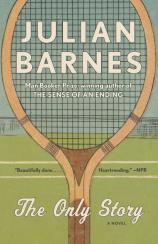The Only Story
Review
The Only Story
Joni Mitchell's plaintive words, "I really don't know love at all," might serve beautifully as a fitting epigraph for Man Booker Prize winner Julian Barnes' tender and touching novel, THE ONLY STORY. This tale of an unusual May-December romance --- between a young man on the cusp of adulthood and a married, middle-aged woman --- is a painful exploration of love's mysteries and the lifelong heartbreak that follows in the wake of a passionate affair's slow unraveling.
Spanning the period from the 1960s to the near present, the novel recounts the relationship between Paul Roberts and Susan Macleod that begins at a tennis club in a London suburb during the summer after Paul's first year at university. Forty-eight-year-old Susan, a mother of two, is party to a 25-year marriage that’s desiccated both emotionally and sexually, and so her desire is understandable, as anomalous as its object may be.
For all the unusual qualities of this pairing, it's hard not to wish the lovers well, as Susan eventually leaves her husband to take up residence with Paul, now studying to become a solicitor, in a London house. But instead of an enduring love story, we witness the gradual decay of the lovers' relationship for reasons that seem beyond their power to control, or, for that matter, even influence. Paul never falls out of love with Susan, but he reluctantly comes to understand that their relationship is doomed.
"Barnes is an elegant writer, and much of the melancholy charm of the novel lies in the elegiac quality of its storytelling, as he resorts to a technique that seems intended to shape our perception of the principal characters."
It's impossible to read this novel without mental associations to the tale of Benjamin Braddock and Mrs. Robinson in The Graduate, but the romance between Paul and Susan does not grow out of some listless ennui. Instead, both characters seem to believe, with an appealing earnestness, in the power of romantic love and conclude, with equal fervor, that they've found it in each other. The fact that their relationship, which would be considered unusual in any age, plays out at a time and in a social setting that viewed it as utterly scandalous --- "so far beyond the pale that it could not even be admitted, much less sensibly discussed" --- makes the story all the more intriguing. This was England in the days just before the "Swinging Sixties," and while neither Paul nor Susan seems to possess a strong rebellious streak, their liaison emphatically defies the social and sexual mores of their time and social class.
Barnes is an elegant writer, and much of the melancholy charm of the novel lies in the elegiac quality of its storytelling, as he resorts to a technique that seems intended to shape our perception of the principal characters. The novel's first section is told in the first person by Paul, a narrator who assures us, with perhaps a touch too much protest, that he is "not trying to spin you a story; I'm trying to tell you the truth." Shortly after the lovers have established their London home, the narrative shifts into the second person, simultaneously creating distance while increasing our empathy for Susan and Paul's plight. And then, in a final section offered from the vantage point of a full lifetime, Barnes draws back into a more conventional third person viewpoint, save for a final scene that's made all the more touching for its frankness.
The mysterious operation of memory is also a topic that's filtered through each of these perspectives. Early on, Paul concedes the unintentional flaws in his recollection of these events, noting that there's a "different authenticity to memory, and not an inferior one," as he informs us that "I'm remembering the past, not reconstructing it." But in the end, he confesses, "retrospective reorderings of life are always likely to be self-serving."
And inevitably, a truthful novel about a tragic love affair must offer some observations on the nature of love itself. On this score, Barnes does not disappoint. Throughout his life, Paul maintains a notebook in which he records what people --- "Great novelists, television sages, self-help gurus, people he met in his years of travelling" --- have said about love. But when he periodically reviews these entries, he crosses out the ones whose truth he no longer believes, a practice that "left him with only two or three temporary truths." So when he concludes, "In love, everything is both true and false; it's the one subject on which it's impossible to say anything absurd," we understand both the candor and resignation of that statement.
"Perhaps love could never be captured in a definition," Paul muses near the end of the novel, "it could only ever be captured in a story." THE ONLY STORY is a gracefully told and irredeemably sad one, but it's an honest rendering of the arc of a great passion, from birth to death. It reveals some painful truths about what it can mean to be in love, but more importantly, about what it means to be human.
Reviewed by Harvey Freedenberg on April 20, 2018
The Only Story
- Publication Date: March 5, 2019
- Genres: Fiction
- Paperback: 272 pages
- Publisher: Vintage
- ISBN-10: 0525563067
- ISBN-13: 9780525563068




